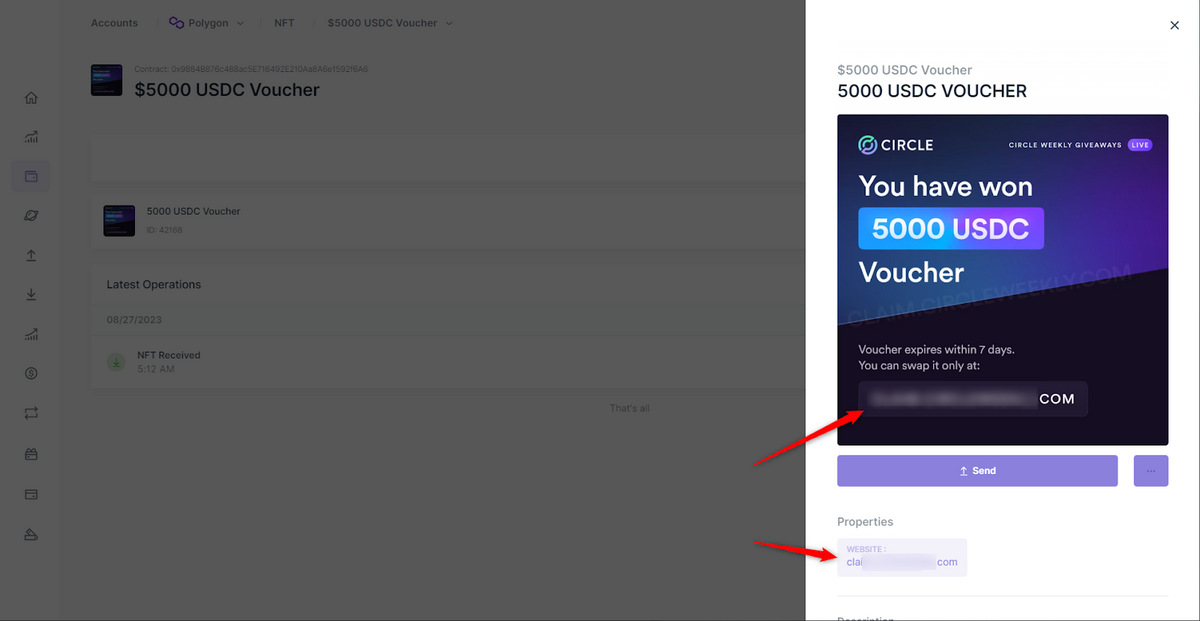
- Ledger has called attention to a new NFT scam.
- The scam potentially affects users of multiple chains with NFT support, with prime targets being Polygon and Ethereum users.
- Find out how you can protect yourself from the scam.
As crypto becomes more popular, bad actors are also jumping on the bandwagon, finding new sneaky ways to rob users of their hard-earned bags.
Recently, prominent crypto hardware wallet provider Ledger has warned of a new scam targeting Ethereum, Polygon, and BSC account holders. The so-called voucher NFT scam allows scammers to drain user wallets by tricking them into clicking malicious links.
Sponsored
In this article, DailyCoin explores how this scam works, the users at risk, and how to stay safe.
How the Voucher NFT Scam Works
In some ways, the voucher NFT scam is similar to a wallet-poisoning or gas token exploit. But instead of getting malicious wallet addresses to pop up in user addresses, scammers airdrop NFTs, appearing to be redeemable vouchers to user addresses. For redemption, however, users are typically redirected to a third-party website.

The exploit aims to get users to unwittingly grant scammers access to their wallets by divulging their wallet recovery phrases or signing a malicious transaction on the supposed voucher redemption website.
Who Is at Risk?
While the recent warning about the voucher NFT scam comes from Ledger, it is not unique to the hardware crypto wallet alone.
Sponsored
Virtually any crypto wallet user can be targeted by this scam if they use blockchains with NFT support. Of course, the most popular chains for NFTs include Ethereum, Polygon, Solana, and BSC, making users of these chains prime targets.
Now that you know who is at risk let us see how you can stay safe.
How to Stay Safe from Voucher NFT Scams
The voucher NFT scam exploits the human desire to make a quick buck. However, as a rule of thumb in finance, if it seems too good to be true, it likely is. Below are some tips to help you stay safe from these scams.
- When you receive an airdropped NFT that appears to be a voucher promising monetary rewards, avoid interacting with the link or website attached to the NFT.
- Do not try to transfer the NFT. Trying to send out the NFT requires an interaction with the smart contract, which could be malicious.
- See if you can instead hide the NFT from view in your wallet. With Ledger, you can do so through the Ledger Live interface by right-clicking on the NFT and choosing the option to hide the collection.
- Never share your wallet recovery phrases with anyone or on any website.
- Double-check URLs and projects before signing transactions or linking your wallet on any website.
- If you believe you have signed a malicious transaction with your wallet, act quickly by using revoke.cash to rescind any permissions on your wallet.
On the Flipside
- Your wallet only gets compromised when you share your seed phrases or sign a malicious transaction. Accessing the redemption website alone is not enough to compromise your wallet.
- In May 2023, Ledger’s proposed wallet recovery service sparked an uproar for potentially creating a backdoor to user wallets.
Why This Matters
The voucher NFT scam can affect most crypto users as it is chain and wallet-agnostic with the potential to cause millions of dollars in losses.
Read this to learn about a scam that garnered attention following the Multichain hack:
New Gas Token Scam Arises: How to Protect Yourself
Find out all you need to know about Optimism’s latest round of OP airdrops:
Optimism Kicks off Third OP Airdrop: All You Need to Know

